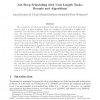Free Online Productivity Tools
i2Speak
i2Symbol
i2OCR
iTex2Img
iWeb2Print
iWeb2Shot
i2Type
iPdf2Split
iPdf2Merge
i2Bopomofo
i2Arabic
i2Style
i2Image
i2PDF
iLatex2Rtf
Sci2ools
AOR
2007
2007
Job Shop Scheduling with Unit Length Tasks: Bounds and Algorithms
We consider the job shop scheduling problem unit−Jm, where each job is processed once on each of m given machines. Every job consists of a permutation of tasks for all machines. The execution of any task on its corresponding machine takes exactly one time unit. The objective is to minimize the overall completion time, called makespan. The contribution of this paper are the following results: (i) For any input instance of unit−Jm with d jobs, the makespan of an optimum schedule is at most m + o(m), for d = o(m1/2). This improves on the upper bound O(m + d) given in [LMR99] where O hides a constant equal to two as shown in [S98]. For d = 2 the upper bound is improved to m+⌈ √ m ⌉. (ii) There exist input instances of unit−Jm with d = 2 such that the makespan of an optimum schedule is at least m + ⌈ √ m ⌉, i.e., our upper bound for d = 2, see result (i), cannot be improved. (iii) We present a randomized on-line approximation algorithm for unit−Jm with the best known ap...
AOR 2007 | Input Instances | Machine | Upper Bound |
Related Content
| Added | 08 Dec 2010 |
| Updated | 08 Dec 2010 |
| Type | Journal |
| Year | 2007 |
| Where | AOR |
| Authors | Juraj Hromkovic, Tobias Mömke, Kathleen Steinhöfel, Peter Widmayer |
Comments (0)

